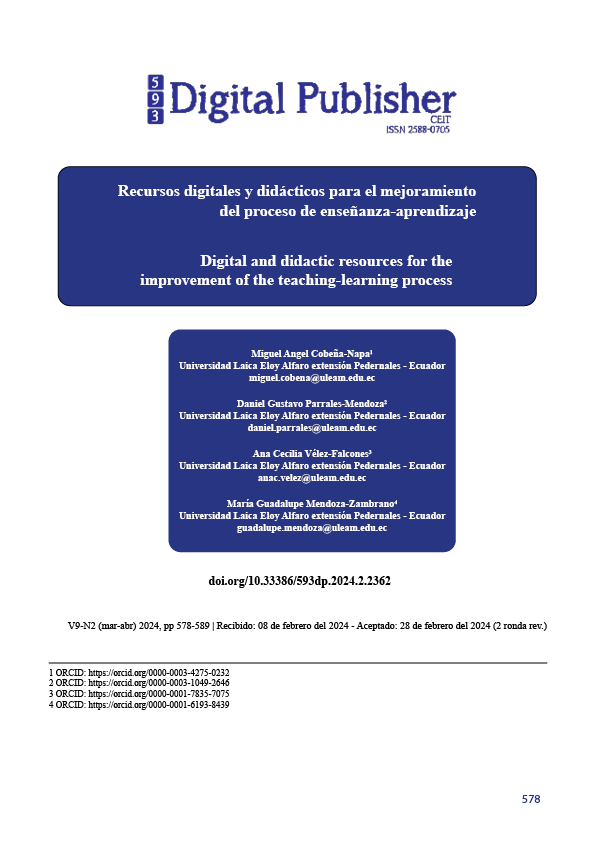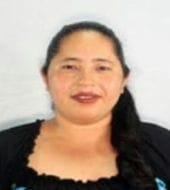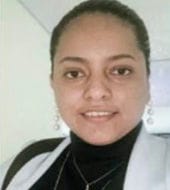Digital and didactic resources for the improvement of the teaching-learning process
Main Article Content
Abstract
The objective of this research is to propose a guide of digital and didactic resources for the improvement of the teaching-learning process aimed at the teachers of the Pedernales Technical Educational Unit (Unidad Educativa Técnico Pedernales). The same arises from the lack of digital and didactic resources in the teaching process.
The study was framed in the non-experimental field design, of qualitative type, it is an observational study, through the application of a survey. The population consisted of 80 teachers, and the sample consisted of 21 teachers of the Pedernales Technical Educational Unit, directly related to the study problem of the current research under inclusion and exclusion criteria. For the collection of information, a survey was used, whose questionnaire was validated by experts in Basic Education.
The results showed that teachers show interest in investigating digital and didactic resources, they are aware of some digital resources that they have been able to incorporate in the teaching-learning process, and they are also fully aware that in order to promote learning, new techniques that promote the development of imagination and creativity should be applied. It is concluded that ongoing training for teachers on issues concerning digital and didactic resources, as well as the use of new digital tools contributes significantly to the teaching-learning process.
Downloads
Article Details

This work is licensed under a Creative Commons Attribution-NonCommercial-ShareAlike 4.0 International License.
1. Derechos de autor
Las obras que se publican en 593 Digital Publisher CEIT están sujetas a los siguientes términos:
1.1. 593 Digital Publisher CEIT, conserva los derechos patrimoniales (copyright) de las obras publicadas, favorece y permite la reutilización de las mismas bajo la licencia Licencia Creative Commons 4.0 de Reconocimiento-NoComercial-CompartirIgual 4.0, por lo cual se pueden copiar, usar, difundir, transmitir y exponer públicamente, siempre que:
1.1.a. Se cite la autoría y fuente original de su publicación (revista, editorial, URL).
1.1.b. No se usen para fines comerciales u onerosos.
1.1.c. Se mencione la existencia y especificaciones de esta licencia de uso.
References
Álvarez, E. (2021). Recursos y materiales didácticos digitales. División de desarrollo académico, Universidad de San Carlos de Guatemala. .https://diged.usac.edu.gt/wp-content/ uploads/2021/03/Diplomado-actualizacio%CC%81n-docentemarzo-2021-.pdf
Bazurto Caicedo, C. A. (2021). La Educación rural en san Lorenzo, sus posibilidades y limitaciones. Revista Científica Hallazgos, 4(1), 49-58. https://revistas.pucese.edu.ec/hallazgos21/article/view/535
Bermúdez, J. (2021). El aprendizaje basado en problemas para mejorar el pensamiento crítico: revisión sistemática. Revista INNOVA, 6(2), https://doi.org/10.33890/innova.v6.n2.2021.1681
Castillo, D. (2020). Las TIC en los procesos de enseñanza-aprendizaje desarrollados por maestros tutores de Educación Primaria en la Región de Murcia. Revista Interuniversitaria de Investigación en Tecnología Educativa, 9(1). 1-14. https://doi.org/10.6018/riite.432061
Cepeda, O., Gallardo, I. y Rodríguez, J. (2018). La evaluación de los materiales didácticos digitales. RODERIC. https://roderic.uv.es/handle/10550/63720
Colman, F. (2019). Recursos didácticos y la educación inclusiva. Revista Científica Estudios e Investigaciones, 1(2). 31-45. http://revista.unibe.edu.py/index.php/rcei/article/view/320
Díaz, J. (2006). Los recursos y materiales didácticos en educación física. apunts, Educación Física y Deporte, 1(43), 42-52.
Fernández, I. (2018). Las TICS en el ámbito educativo. Educrea. https://educrea.cl/las-tics-en-el-ambito-educativo/
García, A. (2017). Recursos digitales para la mejora de la enseñanza y el aprendizaje. Universidad de Salamanca. https://gredos.usal.es/handle/10366/131421
García, L. (2022). Radio, televisión, audio y vídeo en educación. Funciones y posibilidades, potenciadas por el COVID-19. Revista Iberoamericana de Educación a Distancia. Portal de Revistas de la UNED. https://revistas.uned.es/index.php/ried/article/view/31468
González, M. (2020, enero 1). Ecologías digitales de aprendizaje y desarrollo profesional del docente universitario. Revista Comunicar, 5(1), 48-52. https://www.revistacomunicar.com/index.php?contenido=detalles&numero=62&articulo=62-2020-01
Hernández, R.; Fernández, C.; Baptista, M. (2014). Metodología de la Investigación, décima edición. McGraw Hill. https://www.icmujeres.gob.mx/wp-content/uploads/2020/05/Sampieri.Met.Inv.pdf
Hernández, J., Jiménez, Y. y Rodríguez, E. (2020). Más allá de los procesos de enseñanza-aprendizaje tradicionales: construcción de un recurso didáctico digital. Revista Iberoamericana para la investigación y el desarrollo educativo, 10(20), 1-27. https://www.scielo.org.mx/scielo.php?pid=S200774672020000100120&script=sci_artte%20xt
Higueras, M. y Molina, E. (2019). El juego como recurso didáctico en la formación inicial docente. Digibug. https://digibug.ugr.es/handle/10481/59299
León, J., y Cisneros, P. (2021). Vista de Competencias y recursos digitales para la enseñanza aprendizaje en educación básica superior. Instituto Internacional de Investigación y Desarrollo Tecnológico Educativo. https://www.indteca.com/ojs/index.php/Revista_Scientific/article/view/642/1277
Luque, A. y Galora, R. (2019, diciembre 2020). Vista de Impacto de la tecnología en la sociedad: el caso de Ecuador. Revista Ciencias Pedagógicas e Innovación. 7(2), 40-47. https://incyt.upse.edu.ec/pedagogia/revistas/index.php/rcpi/article/view/299/422
Miralles, P., Gómez, C., Arias, V., Fontal, O. (2019). Recursos digitales y metodología didáctica en la formación inicial de docentes de Historia. Revista Comunicar. https://www.revistacomunicar.com/ojs/index.php/comunicar/article/view/C61-2019- 04
Pérez, L., y Ochoa, A. (2017). La participación de los estudiantes en una escuela secundaria: retos y posibilidades para la formación ciudadana. Revista mexicana de investigación educativa rmie, 22(72). https://www.scielo.org.mx/pdf/rmie/v22n72/1405-6666-rmie-22-72-00179.pdf
Rivera, A. G. (2021). Recursos educativos digitales y su importancia en la educación del siglo XXI. Plataforma Educativa Luca. https://www.lucaedu.com/recursos-educativos-digitales/
Robert, R., Espinosa, Y.; Prado, O.; Barroso, M. (2020). Consideraciones generales de los métodos de enseñanza menos utilizados en la educación superior en Cuba. Revista cubana de educación superior, 39(2), 1-17. http://scielo.sld.cu/scielo.php?script=sci_abstract&pid=S0257-43142020000200007
Sandoval, V. (2021). El aula invertida como estrategia didáctica. Revista iberoamericana de educación a distancia. 24(2) 285-308. https://redined.educacion.gob.es/xmlui/handle/11162/233064
Solórzano, J., Lituma, L.; Espinoza, E. (2020). Estrategias de enseñanza en estudiantes de educación básica. Revista Metropolitana de Ciencias Aplicadas, 3(3), 158-165. http://remca.umet.edu.ec/index.php/REMCA/article/view/322
Vargas, G. (2020). Estrategias educativas y tecnología digital en el proceso enseñanza aprendizaje. Revista Cuadernos, 8(1), 69-77. http://www.scielo.org.bo/scielo.php?pid=S165267762020000100010&script=sci_arttext
Vargas, G (2017). Recursos educativos didácticos en el proceso de enseñanza aprendizaje. Educación Médica Contínua, 58(1), 68-74. http://www.scielo.org.bo/pdf/chc/v58n1/v58n1_a11.pdf
Vidal, M.; Vega, A. y López, S. (2019, octubre 28). Uso de materiales didácticos digitales en las aulas de primaria. Redined. https://redined.educacion.gob.es/xmlui/handle/11162/196070
Yánez, V., y Nevárez, M. (2018). Exelearning: Recurso digital de una estrategia didáctica de enseñanza-aprendizaje de matemática. Dialnet. Retrieved March 2, 2023, from https://dialnet.unirioja.es/servlet/articulo?codigo=6765674





